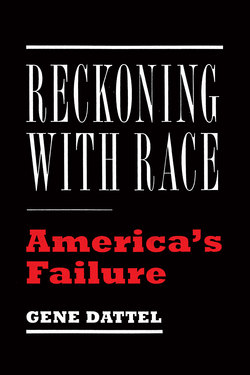Читать книгу Reckoning with Race - Gene Dattel - Страница 8
На сайте Литреса книга снята с продажи.
ОглавлениеAcknowledgments
One of the many fulfilling aspects of writing is the exchange of ideas with others over a long period of time. I have been duly blessed with the thoughts, experiences, insights, and criticisms of many people. It is the historian’s pleasure to become acquainted with words and deeds of the past and to test their relevance today. Equally important is the attempt to grapple with current issues and policies. Any faults in the thesis/argument of this book are solely my own. The public forums provided by my previous books, The Sun That Never Rose and Cotton and Race in the Making of America, were invaluable in gauging the reactions of live audiences to the material’s significance. Unvarnished feedback has always been central to my understanding of what was important and what was of interest.
The book’s journey owes an enormous debt to my former college professor and friend, the late Robin W. Winks at Yale. His energy, devotion to students, intellectual bandwidth, and facility with comparative history were legendary. It is to him that I owe much of my interest in and respect for racial, economic, and comparative history. My education at Yale was further enhanced by Staughton Lynd’s course in Southern history, his thoughtful approach to teaching, and his real-time experience as director of the education part of the Mississippi Freedom Summer of 1964.
The accomplished and experienced editor Ivan R. Dee was instrumental in clarifying my ideas in a book covering a wide swath of history. Although the opinions in the book are my own, his input challenged me to “think through” the most sensitive and complicated social issue in America—race. As such, it was and continues to be a distinct privilege and pleasure to work with him.
A list of those who have made contributions over the decades would be enormous. In addition to Americans, Japanese and Europeans have enriched my perspective. My brothers, Jerry and Richard Dattel, provide support, information, and valued advice. At our college’s fiftieth reunion, my classmate Michael Dalby masterfully edited the essay that in part became the book and originated the title Reckoning with Race. Conversations with the journalist, author, and teacher Otis Sanford and attorney and civil rights leader Carver Randle Sr. are models for a respectful and vibrant interchange of ideas. I have learned much from Allan Hammons, whose creative and dedicated memorialization of Mississippi Delta cultural heritage for both civil rights and music is a model for others to follow. My publisher, Roger Kimball, has been a fount of knowledge, inspiration, and humor. He and his colleagues at Encounter Books have afforded me the freedom to tackle this evergreen topic with a deeply frank analysis. Their flexibility, guidance, and patience (read: missed deadlines) were truly appreciated.
I am grateful to Rowman & Littlefield for permission to adapt sections of my book Cotton and Race in the Making of America.
Most importantly, I thank my wife, Licia, a true partner in life and in work. Her trusted support as a wonderful editor and her generosity in spirit and in love have made the lengthy task of writing this book possible.
